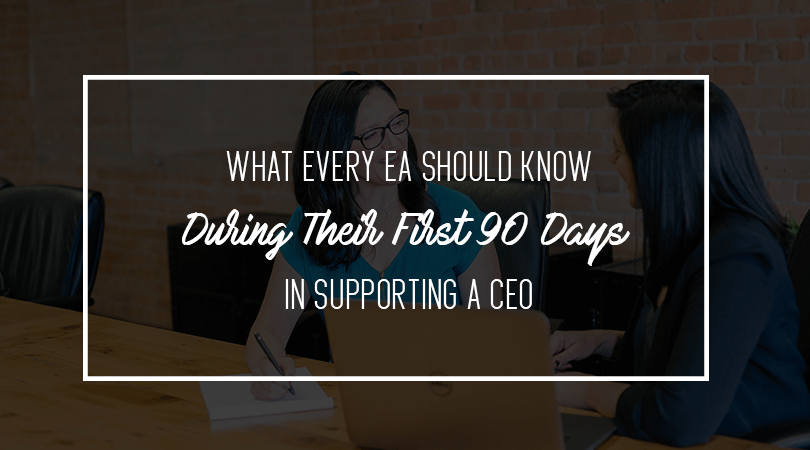What Every EA Should Know during their First 90 Days in Supporting a CEO
With AL-Husein Madhany
If you don’t know Al-Husein Madhany, you should. ASAP. Not only is he a captivating motivational speaker, but Al-Husein (or AHM, as we affectionately refer to him here at ELS) is also the former Facebook Chief Chaos Tamer and Paypal Chief of Staff. At ELS, he speaks on a range of topics that covers the progressive challenges that plague EAs across the globe. Lucky for you (and us!), we sat down with the genius himself as he schooled us on the incredible resources available to EAs that they just aren’t taking advantage of. Read on to see what those are!
Describe the impact that experience has on strategic partnerships between executives and their assistants?
It’s important to recognize that executives are getting younger and younger. Some are representing companies that are worth billions of dollars and they’re 22 years old. I currently work with young CEOs and they are constantly learning, and probably faster than executive assistants because of the nature of what they’re doing. They have no context of what it means to be an executive. They’re constantly mentored by their teams, which include other executives. Our [EA’s] value is really in the deep experience and depth of wisdom [we have] from supporting executives before. We may see the worst of [our execs], but we also see them at their most vulnerable. It’s important that we show them the wisdom we’ve accrued from supporting executives in the past. We have been on this ride before, but they haven’t. For them, this is their first show.
What are executives really looking for in an assistant?
They want the executive assistant who is twice their age, not half. They want the assistant they don’t have to train, the one who can hit the ground running. They want the assistant who has seen board members try to sue the company. They want somebody who won’t get stressed about weather patterns affecting flights, or if you’ll make it to the conference because they know you have a plan B and C in your back pocket. That’s who they want to hire.
If an EA has only supported one executive in his or her career, how can he or she gain this wisdom?
I think asking for more context is the start, and finding what is interesting to you. Ask, What meetings can I attend? Start there. Which internal meetings can I attend, which external meetings can I attend? You can learn more about the business just by being a fly on the wall. Remember, there are people in the world who would die to be able to shadow one of your executives. We have so much access that we’re not taking advantage of.
[Editor’s note: Here are some pitches from Al-Husein that you can use!]
“I have your trust. I’ve been managing the calendar for four years and now I want to go deep inside. What’s interesting to me is X.”
“I want to learn how to do X and the thought process behind X, and I’d like to sit in if you’re comfortable with that.”
“I’m interested in mergers or acquisitions, or are we going to build this ourselves?”
“I want to learn the decision tree. You’re a walking MBA, and I want to understand how you’re making these decisions because clearly you’re a successful executive.”
“Is it possible for me to be in the room, to debrief with you on the external meetings so I can action things, so I can partner better with you.”
Where are some of the best resources hiding in plain sight?
There are many opportunities to take advantage of. Your executive’s inbox has most of your answers. And not just their inbox, but their sent box. If your executive has a doc or Powerpoint or diagram from a meeting, read it! Print it out! Sit with it! If you don’t know the words, look them up. If you don’t know the industry, Google it! If you’re an executive assistant for a public company, and you don’t know how your stock is performing, you are underperforming. If you have not heard the earning’s conference calls, that’s a missed opportunity for learning and a way to add value to your executive. Every company has an Intranet or Slack, and there’s an institutional history of your organization. Spend time learning it, going through it and understanding it.
So what are the top three things a rockstar EA should do in the first 90 days?
There are three things that executive assistants should know within the first 90 days of starting a new role, whether it’s a for-profit or nonprofit company:
- Who are the competitors? It might not be competitors that are perceived by the public to be competitors. Who are the competitors that the executive thinks about? Within 30 days, know who your competitors are because that is who your executive is thinking about, and who is he is playing three-dimensional chess with in the global corporate environment.
- Who are your strategic partners? Here’s an example: During the recession, which industry/vertical received the largest boon from increased gas prices? Credit card companies made more money from gas stations than gas companies made from selling gas. So if you are part of the distribution supply chain from oil and gas, you should know the players. Mastercard, Visa—those are your partners, because those are the players who are making the margins at every transaction at the pump. This is why credit card companies partnered with gas stations to create credit offerings like Shell, Mobil and Exxon credit cards were very popular during that time. They’re not traditional partners. So you have this perspective, an MBA in-training from sitting with executives at that level.
- Find the levers that your executive can pull in order to change the game. For example, if you’re in HR, in a tough economy they might turn off full-time hiring and increase contract hiring. Need to have higher employee engagement? Turn on more benefits. If you’re in marketing: global marketing domestic marketing, field marketing, and google adwords is too expensive, facebook ads are expensive, what’s your new lever?
Once you understand the competition, strategic partnerships and levers, you have a very valuable perspective on the drivers and you can start thinking like your executive. And if you can convince your executive that you know those things—through the questions you ask and the conversations you have—you will understand the decisions they are making and reasons why they are making those decisions.



